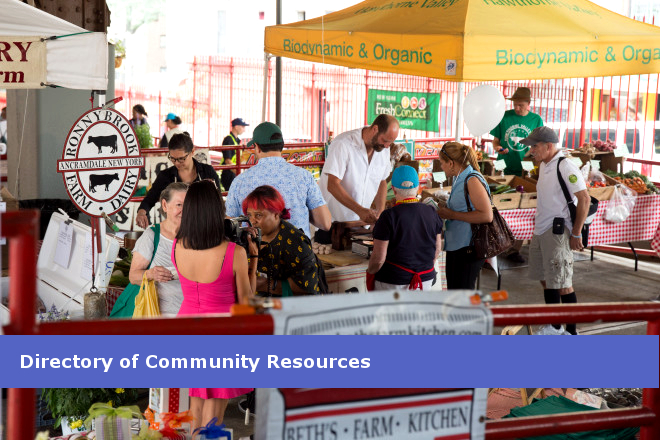
East Harlem is an energetic, historic community with a network of resources for the many people who live, work, shop, eat, and visit El Barrio. Here we have compiled a directory of organizations that are involved in some way with food systems work in our neighborhood. If you or an organization you know is missing from this list, please email us at info@nycfoodpolicy.org and we’ll include the information.
Download the NYC Project Launch East Harlem Community Resource Guide.
(click the category below for organization listings and links)
Community Advocacy
Community advocacy organizations in East Harlem are involved in activities that aim to improve the lives of community residents through policy, activism, and community empowerment. Several East Harlem non-profits have implemented efforts focused on improving food affordability and accessibility to better the health and lives of individuals living in the community.
Community Gardens
Community gardens provide important shared green sites to grow food, provide valuable open space, serve as dynamic classrooms for NYC schoolchildren, create a sense of community, and challenge communities to interact. East Harlem is home to a multitude of these vibrant, green, urban spaces.
Economic Development & Food Retail
East Harlem local retail is an important part of its cultural and neighborhood identity. Organizations focused on neighborhood economic development understand that by increasing the supply of goods and services that is demanded by the community, local retail can become stronger than it is now, fulfilling consumer demand and creating new jobs and new opportunities for the residents of East Harlem.
Education/Youth
Childhood obesity is a serious health concern disproportionately affecting east Harlem youth. Several organizations have developed food and health related programming involving education and advocacy as a means to address obesity by empowering and improving the health of East Harlem youth.
Farmers Markets & CSAs
Farmers markets and community-support agriculture models (CSA) help create a more sustainable food system by making healthy, fresh, local food more accessible and affordable to East Harlem residents while supporting farmers and workers in the surrounding regions.
Food Pantries & Soup Kitchens
Emergency food organizations, also known as food pantries and soup kitchens, attempt to address the lack of geographical and financial access to food in East Harlem. Many of these organizations are faith-based and volunteer-run. They tend to operate varying days and times, so while not completely reliable, many residents also depend on these organizations’ services. Some, notably the New York Common Food Pantry, have extended their operation hours beyond the workday to provide a more consistent supply of food for its patrons.
Local Government
The local government has recognized the multitude of food insecurity issues affecting East Harlem residents and taken steps to target hunger and obesity problems and improve access to healthy and affordable foods.
Local Retail
Local retail in East Harlem is important to the economic viability of the community, both meeting consumer demands and providing local jobs.
WIC & SNAP Offices
The Special Supplemental Nutrition Program for Women, Infants and Children (WIC) and the Supplemental Nutrition Assistance Program (SNAP) are government-subsidized food programs that assist low-income families and their children to purchase healthy foods through an EBT card or a WIC check. Stores licensed to accept SNAP and WIC provide their customers additional payment methods and are reimbursed fully for purchases using these payment methods.

